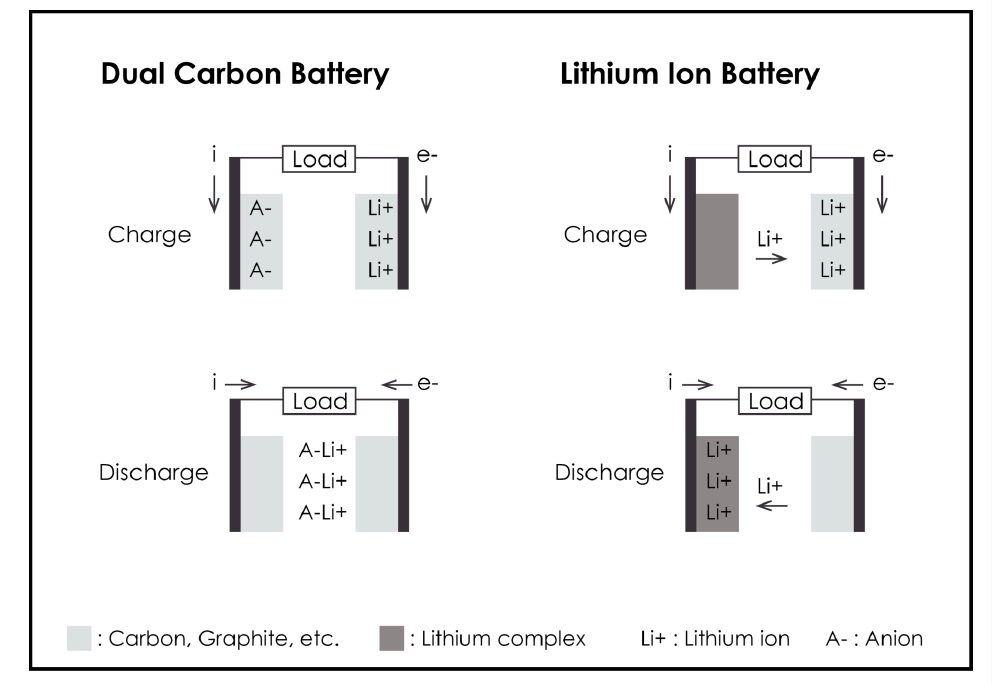LTLFTcomposite
Well-known member
Sounds great... but then all the new battery stories do.

The intelligentsia prefers that all discussion of possible new battery technologies be sequestered in a single thread.Flashman said:Is there a thread already on the Dual Carbon version?
At least this vaporware seems to be headed for limited production later this year.Stoaty said:Moderator: please move to existing vaporware battery thread.
Flashman said:News Article:
Dual-Carbon Battery: Same Energy Density, Safer, Longer Life Than Lithium-Ion, Says Power Japan Plus.
http://www.greencarreports.com/news...r-life-than-lithium-ion-says-power-japan-plus
A couple of interesting quotes from the article:
"With energy density comparable to lithium-ion, the company claims that its Ryden dual-carbon chemistry can both recharge up to 20 times as fast and deliver more than 4 Volts of power from a single cell."
"In testing, the cell has completed more than 3,000 charge/discharge cycles with virtually no performance degradation, meaning that it could conceivably last the lifetime of a car."
"higher-volume production intended for other markets--including plug-in electric cars--the company will license its technology and consult with existing battery makers to enable them to produce the anode and cathode materials in their own facilities."

A wise move until any of these turn out to be worth more than a few posts of discussion. This latest is interesting but the fact that they don't compare it to the most energy dense and cost effective current chemistry, the Panasonic NCA that Tesla is using, raises the first red flag. NCA chemistry also shows minimal capacity fade to 2000+ cycles, which should be the life of a vehicle and beyond, assuming a 200 mile range pack. Less need for cooling and protection will help increase the pack level density of the new chemistry but I'm not sure even that would raise it to the level of NCA. Charge rate is mostly irrelevant at this point, cables and power delivery become prohibitive at rates much beyond what Tesla is already doing for long range packs.LTLFTcomposite said:The intelligentsia prefers that all discussion of possible new battery technologies be sequestered in a single thread.Flashman said:Is there a thread already on the Dual Carbon version?
Yup, these are all vaporware that will be in production Real Soon Now (TM).smkettner said:At least this vaporware seems to be headed for limited production later this year.
About the same as the Lizard Battery and Model X.
z0ner said:"The Dual Carbon Battery could give a modern electric vehicle a range of almost 500 kilometers (310 miles)"
https://www.youtube.com/watch?v=OJwZ9uEpJOo&feature=youtu.be" onclick="window.open(this.href);return false;
Interesting to note Kaname Takeya Ph.D., CTO of Power Japan Plus has worked on both Prius and Tesla batteries. If this is even slightly viable it would be the single most improvement in battery tech during the last century.
ahagge said:The thing that concerns me about the aluminum air battery is that people might not realize the amount of energy consumed in the process of making that aluminum sheet that they're using up as the battery runs down (that's right - it's not rechargable!). According to this article it takes an average of 15 kWh to produce 1 kg of aluminum (probably significantly less for recycled aluminum). And according to the Green Car Congress article referenced by LindsayNB above, the current battery's energy density is 1.3 kWh/kg (2.0 kWh is what they're shooting for). So while it might be lightweight and high energy density compared to Li-Ion, it's certainly not efficient.
This is one of the most interesting battery ideas I have seen in a long time. Being able to grow the materials for both electrodes in cotton fields instead of having to dig up metals from the Earth sounds like a great way to replace wasteful and damaging ethanol production with a land use that should appeal to farmers and actually offers a real benefit to the environment. To do all that and still reduce the cell's series resistance would be a major breakthrough for the environment, IMO.z0ner said:"The Dual Carbon Battery could give a modern electric vehicle a range of almost 500 kilometers (310 miles)"
https://www.youtube.com/watch?v=OJwZ9uEpJOo&feature=youtu.be" onclick="window.open(this.href);return false;
Interesting to note Kaname Takeya Ph.D., CTO of Power Japan Plus has worked on both Prius and Tesla batteries. If this is even slightly viable it would be the single most improvement in battery tech during the last century.
Enter your email address to join: